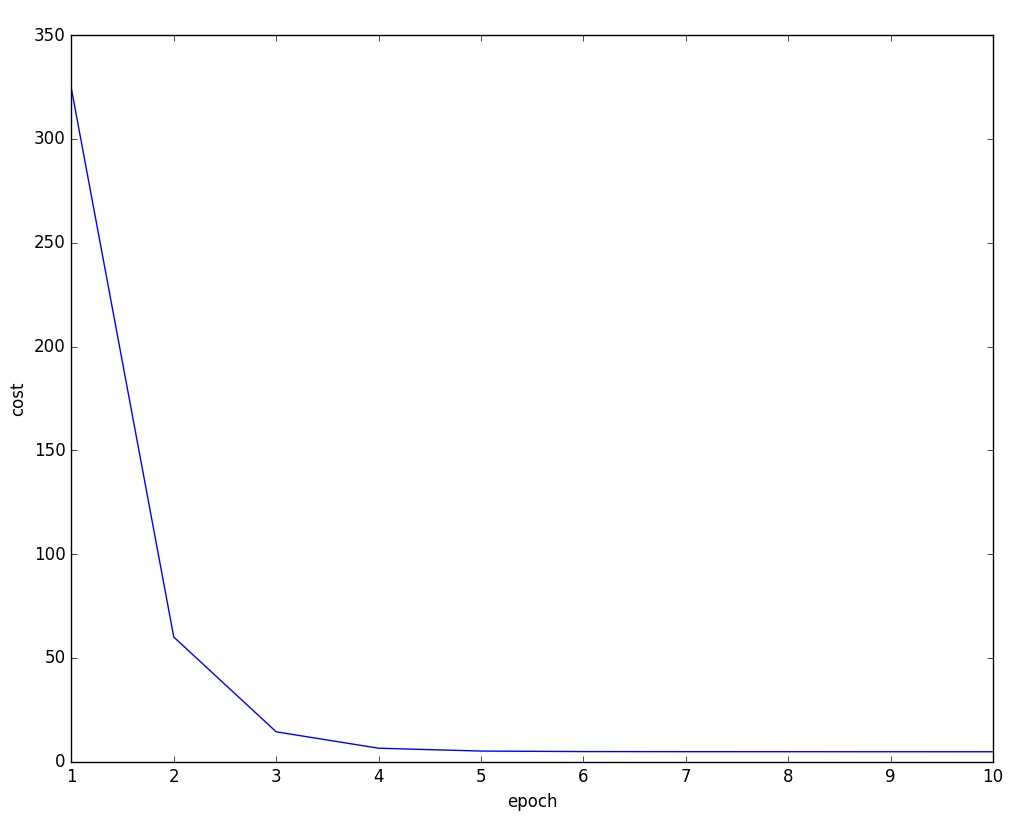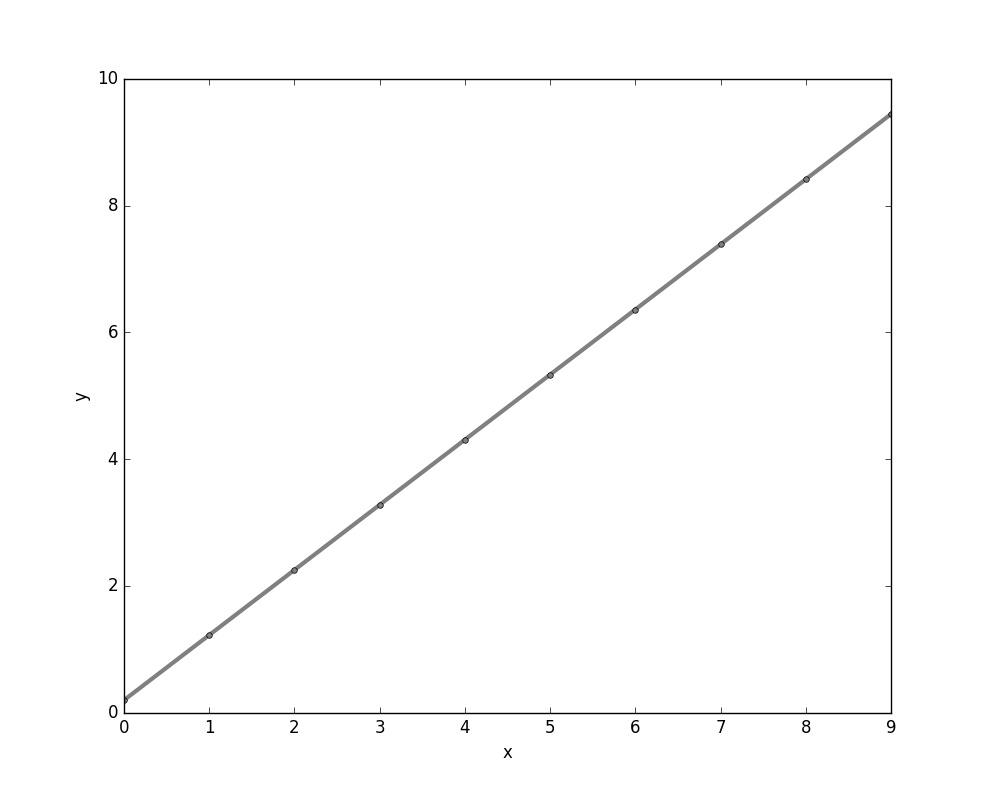Theano入门神经网络(三)
附录一个:Keras学习随笔 http://blog.csdn.net/niuwei22007/article/details/49045909
参考 《Python Machine Learning》这本书的第13章
Theano是Bengio大神课题组弄得。
一、Theano初步
Theano编程三个步骤: 初始化、编译和执行,就是定义符号(变量对象)、编译代码和执行代码
举个例子:计算 z=x1*w1+wo 代码如下:
# -*- coding: utf-8 -*-
__author__ = 'Administrator' import theano
import theano.tensor as T
import random
import numpy as np
from itertools import izip
import matplotlib.pyplot as plt #初始化
x1 = T.scalar()
w1 = T.scalar()
w0 = T.scalar()
z = w1*x1+w0 #编译 net_input = theano.function(
inputs=[w1, x1, w0],
outputs=z
) #执行 print 'net input %.2f'% (net_input(2.0, 1.0 ,0.5))
在写Theano代码时,要注意变量的类型 dtype ,要分清楚我们要使用 64或者32为的int or floats
二、 配置Theano
一般来说 采用CPU时,我们设置float64 ,采用GPU时,需要设置float32
print (theano.config.floatX)
print (theano.config.device)
在window中设置CPU or GPU模式,是在运行cmd后出现的路径下,新建一个.theanorc.txt的文件。文件内容如下图所示

三、使用array结构
一个简单的求和例子
#初始化
x = T.fmatrix(name ='x')
x_sum = T.sum(x, axis=1) # 0 是按列 1 是按行 #编译
calc_sum = theano.function(
inputs=[x],
outputs=x_sum
) #执行
ary = np.array([[1,2,4],[1,2,3]],dtype=theano.config.floatX)
print calc_sum(ary)
shared variable 和 权值更新
#初始化
x = T.fmatrix('x')
w = theano.shared(np.asarray([[0.0,0.0,0.0]],dtype=theano.config.floatX)) z = T.dot(x,w.T) # 这个就是两个矩阵相乘 w是1*3 x是1*3 update = [[w, w+1.0]] # 编译
net_input = theano.function(
inputs=[x],
updates=update,
outputs=z
) # 执行 data = np.array([[1,2,3]],dtype=theano.config.floatX)
for i in range(5):
print w.get_value()
print '%d %.2f' % (i,net_input(data))
可以提取指定数据,代码如下
#初始化
data = np.array([[1,2,3]],dtype=theano.config.floatX)
x = T.fmatrix('x')
w = theano.shared(np.asarray([[0.0,0.0,0.0]],dtype=theano.config.floatX)) z = T.dot(x,w.T) # 这个就是两个矩阵相乘 w是1*3 x是1*3 update = [[w, w+1.0]] # 编译
net_input = theano.function(
inputs=[],
updates=update,
givens={x : data},
outputs=z
) # 执行 for i in range(5):
print w.get_value()
print '%d %.2f' % (i,net_input())
四、 一个线性回归的例子
X_train = np.asarray(
[ [0,0] , [1, 0],
[2,0] , [3, 0],
[4,0] , [5, 0],
[6,0] , [7, 0],
[8,0] , [9, 0]],
dtype= theano.config.floatX
) y_train = np.asarray(
[ 1.0,1.3,3.1,2.0,
5.0,6.3,6.6,7.4,
8.0,9.0],
dtype= theano.config.floatX
) y_train_new = np.asarray(
[ [1.0],[1.3],[3.1],[2.0],
[5.0],[6.3],[6.6],[7.4],
[8.0],[9.0]],
dtype= theano.config.floatX
)
print X_train.shape[1] # shape 0 获取行 shape 1 获取列 def train_linreg(X_train, y_train ,eta, epochs):
costs = []
#初始化array0
eta0 = T.fscalar('eta0')
y = T.fvector(name='y')
X = T.fmatrix(name='X')
w = theano.shared(np.zeros(
shape=(X_train.shape[1] +1 ),dtype= theano.config.floatX), name = 'w') #计算损失函数
net_input = T.dot(X, w[1:]) + w[0] # w[1:] 从第二个到最后一个数据
errors = y - net_input
cost = T.sum(T.pow(errors,2)) #梯度更新
gradient = T.grad(cost,wrt=w)
update = [(w, w- eta0* gradient)] #定义模型
train = theano .function(inputs=[eta0],
outputs=cost,
updates=update,
givens={X:X_train,
y: y_train}) for i in range(epochs):
costs.append(train(eta))
print w.get_value()
return costs, w def predict_linreg(X,w):
Xt = T.matrix(name='X')
net_input = T.dot(Xt, w[1:])+w[0]
predict = theano.function(inputs=[Xt],
givens={w:w},
outputs= net_input)
return predict(X) costs,w= train_linreg(X_train,y_train,eta=0.001,epochs=10)
plt.plot(range(1,len(costs)+1),costs)
plt.tight_layout()
plt.xlabel("epoch")
plt.ylabel('cost')
plt.show()
#
#plt.scatter(X_train, y_train ,marker='s',s=50)
plt.plot(range(X_train.shape[0]),predict_linreg(X_train,w),color='gray',marker='o',markersize=4,linewidth=3)
plt.xlabel("x")
plt.ylabel('y')
plt.show()
结果图:


Theano入门神经网络(三)的更多相关文章
- Theano入门神经网络(一)
Theano是一个Python库,专门用于定义.优化.求值数学表达式,效率高,适用于多维数组.特别适合做机器学习.一般来说,使用时需要安装python和numpy. 首先回顾一下机器学习的东西,定义一 ...
- Theano入门神经网络(四)
这一部分主要介绍用Theano 实现softmax函数. 在多分类任务中经常用到softmax函数,首先上几个投影片解释一下 假设目标输出是y_hat ,激活函数后的Relu y 一个是1.2 一个是 ...
- Theano入门神经网络(二) 实现一个XOR门
与非门的图片如下 示意图 详细解释: 1 定义变量的代码,包括了输入.权值.输出等.其中激活函数采用的是sigmod函数 # -*- coding: utf-8 -*- __author__ = 'A ...
- Theano入门——CIFAR-10和CIFAR-100数据集
Theano入门——CIFAR-10和CIFAR-100数据集 1.CIFAR-10数据集介绍 CIFAR-10数据集包含60000个32*32的彩色图像,共有10类.有50000个训练图像和1000 ...
- 无废话ExtJs 入门教程三[窗体:Window组件]
无废话ExtJs 入门教程三[窗体:Window组件] extjs技术交流,欢迎加群(201926085) 1.代码如下: 1 <!DOCTYPE html PUBLIC "-//W3 ...
- RequireJS入门(三)转
这篇来写一个具有依赖的事件模块event.event提供三个方法bind.unbind.trigger来管理DOM元素事件. event依赖于cache模块,cache模块类似于jQuery的$.da ...
- RequireJS入门(三)
这篇来写一个具有依赖的事件模块event.event提供三个方法bind.unbind.trigger来管理DOM元素事件. event依赖于cache模块,cache模块类似于jQuery的$.da ...
- 【SSRS】入门篇(三) -- 为报表定义数据集
原文:[SSRS]入门篇(三) -- 为报表定义数据集 通过前两篇文件 [SSRS]入门篇(一) -- 创建SSRS项目 和 [SSRS]入门篇(二) -- 建立数据源 后, 我们建立了一个SSRS项 ...
- Bootstrap入门(三十)JS插件7:警告框
Bootstrap入门(三十)JS插件7:警告框 通过这个插件可以为警告信息添加点击以及消失的功能. 当使用一个.close按钮,它必须是第一个子元素.alert-dismissible,并没有文字内 ...
随机推荐
- cocoapods的时候出现的问题 _OBJC_CLASS_$_XXX
最新的cocoapod导入xmpp的时候,会出现循环依赖,所以撸主选择了手动导入. 一开始还用的挺开心的,后来,使用cocoapods导入其他的框架,发现调用的时候总是报错. Undefined sy ...
- 解剖SQLSERVER 第十五篇 SQLSERVER存储过程的源文本存放在哪里?(译)
解剖SQLSERVER 第十五篇 SQLSERVER存储过程的源文本存放在哪里?(译) http://improve.dk/where-does-sql-server-store-the-sourc ...
- .Net Core CLI–Ubuntu 14安装
sudo sh -c 'echo "deb [arch=amd64] http://apt-mo.trafficmanager.net/repos/dotnet/ trusty main&q ...
- dojo/_base/lang源码分析
dojo/_base/lang模块是一个工具模块,但几乎用dojo开发的app都会用到这个模块.模块中的方法能够在某些开发场景中避免繁冗的代码,接下来我们一起看看这些工具函数的使用和原理(仅仅是原理的 ...
- 规范化的软件项目演进管理--从 Github 使用说起
规范化的软件项目演进管理 从 Github 使用说起 1 前言 首先,本文的层次定位是:很基本很基础的 Github 工具的入门级应用,写给入门级的用户看的. 基本上工作过几年的人,下面描述的这些 ...
- [51单片机] 以PWM控制直流电机为例建一个简单的51工程框架
目录 1)功能概述 2)引脚连接 3)框架介绍 4)模块说明 5)复用规则 6)工程链接 1)功能概述 名称:独立按键控制直流电机调速 内容:对应的电机接口需用杜邦线连接到uln2003电机控制端; ...
- jni和java对应关系
Java 类型 本地类型 描述 boolean jboolean C/C++8位整型 byte jbyte C/C++带符号的8位整型 char jchar C/C++无符号的16位整型 short ...
- redis系列-主从复制
redis自身提供了主从的机制,通过配置可以实现服务的备份(Master->Slave). 配置项 slaveof <masterip> <masterport> mas ...
- UIImage NSData 相互转化
//UIImage 转为 NSData NSData *imageData = UIImagePNGRepresentation(aImage); //NSData 转为 UIImage UIImag ...
- Java学习第一天
Java学习第一天 对于网络管理员或者黑客必须知道的八个cmd命令 详情请参考:http://www.2cto.com/os/201608/533964.html nbtstat ...
